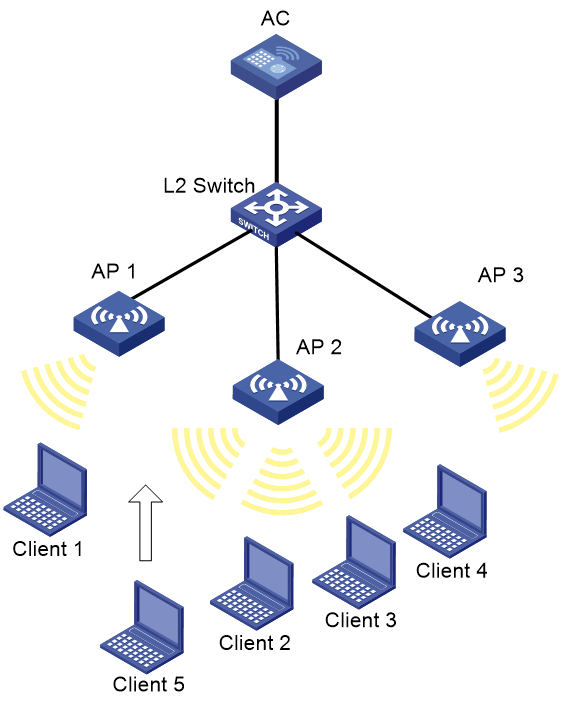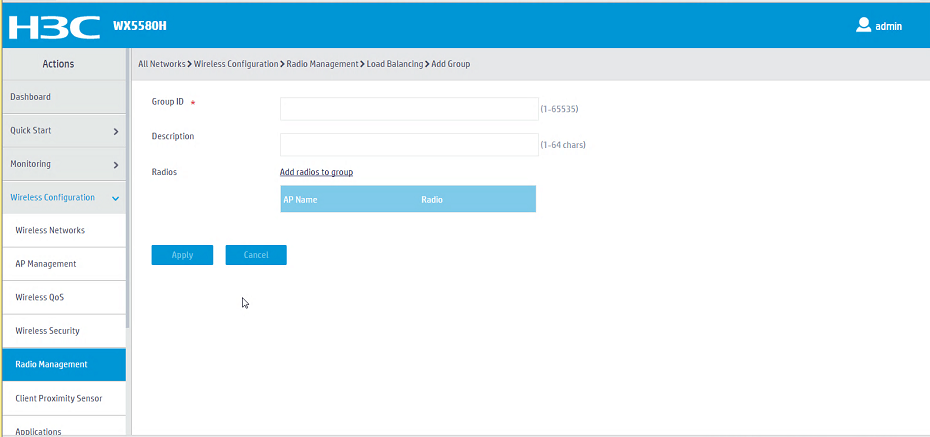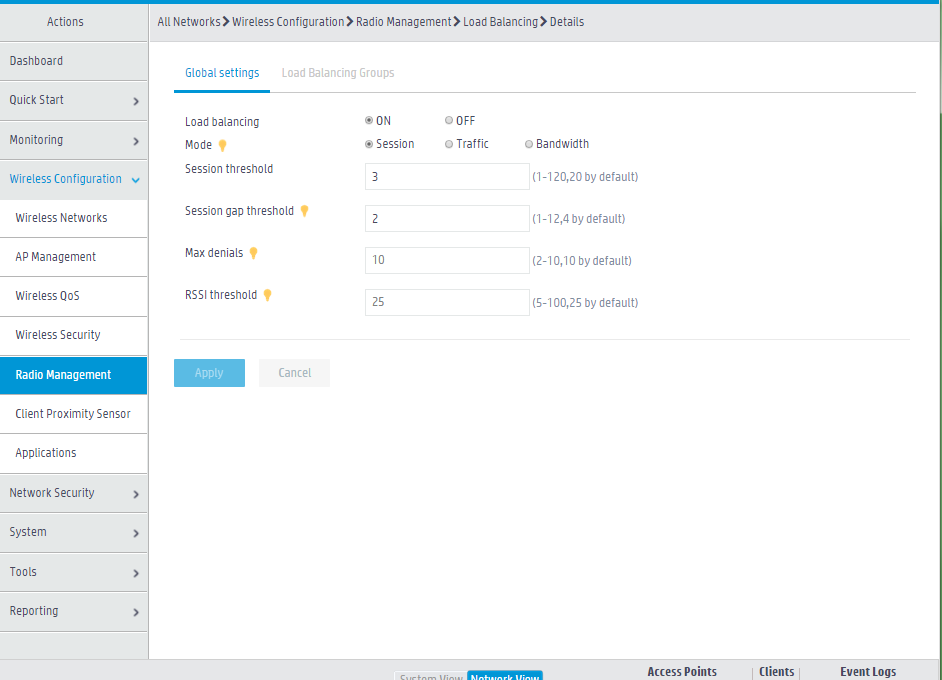- Table of Contents
-
- 05-Web configuration examples (AC+fit AP)
- 01-Telnet Access Control Configuration Example
- 02-IPv6 Telnet Access Control Configuration Example
- 03-Web Access Control Configuration Example
- 04-User Role Assignment for Local Web Authentication Users Configuration Example
- 05-SSH Local Authentication Configuration Example
- 06-SSH User Remote Password Authentication Configuration Example
- 07-IPv6 SSH User Remote Password Authentication Configuration Example
- 08-Password Control Configuration Example
- 09-Licensing Configuration Example
- 10-Automatic License Installation Configuration Example
- 11-Layer 2 Static Link Aggregation Configuration Example
- 12-Layer 2 Dynamic Link Aggregation Configuration Example
- 13-PPPoE Client Configuration Example
- 14-Static IPv6 Address Configuration Example
- 15-IPv6 Static Routing Configuration Example
- 16-Static IPv4 DNS Configuration Example
- 17-Static IPv6 DNS Configuration Example
- 18-IGMP Snooping Configuration Example
- 19-MLD Snooping Configuration Example
- 20-IPv4 DNS Proxy Configuration Example
- 21-IPv6 DNS Proxy Configuration Example
- 22-Static NAT Configuration Example
- 23-Dynamic NAT Configuration Example
- 24-IPv4 ACL-Based Packet Filter Configuration Example
- 25-IPv6 ACL-Based Packet Filter Configuration Example
- 26-ARP Attack Protection Configuration Example
- 27-ARP Proxy Configuration Example
- 28-Dynamic IPv4 DNS Configuration Example
- 29-Dynamic IPv6 DNS Configuration Example
- 30-WLAN Access Configuration Example
- 31-Different Wireless Services on Different Radios Configuration Example
- 32-CAPWAP Tunnel Establishment Through DHCP Configuration Example
- 33-CAPWAP Tunnel Establishment Through DHCPv6 Configuration Example
- 34-CAPWAP Tunnel Establishment Through DNS Configuration Example
- 35-CAPWAP Tunnel Establishment Through DNSv6 Configuration Example
- 36-Auto AP Configuration Example
- 37-AP Group Configuration Example
- 38-Radio Management Configuration Example
- 39-Load Balancing Group-Based Session-Mode Load Balancing Configuration Example
- 40-Radio-Based Session-Mode Load Balancing Configuration Example
- 41-A-MPDU and A-MSDU Configuration Example
- 42-Device Classification and Countermeasure Configuration Example
- 43-Malformed Packet Detection and Flood Attack Detection Configuration Example
- 44-Signature-Based Attack Detection Configuration Example
- 45-802.1X RADIUS-Based AAA Configuration Example
- 46-VLAN Interface-Based Direct Portal Authentication Configuration Example
- 47-Service Template-Based Direct Portal Authentication Configuration Example
- 48-Wireless Spectrum Analysis Configuration Example
- 49-Auto DFS Configuration Examples
- 50-Auto TPC Configuration Examples
- 51-Whitelist-Based Client Access Control Configuration Example
- 52-Blacklist-Based Client Access Control Configuration Example
- 53-CAC Configuration Example
- 54-WLAN Probe Configuration Example
- 55-Intra-AC Roaming Configuration Example
- 56-Bonjour Gateway Configuration Example
- 57-IPv4 Multicast Optimization Configuration Examples
- 58-IPv6 Multicast Optimization Configuration Examples
- 59-Ping Configuration Example
- 60-Local Packet Capture Configuration Example
- 61-Remote Packet Capture Configuration Example
- Related Documents
-
| Title | Size | Download |
|---|---|---|
| 39-Load Balancing Group-Based Session-Mode Load Balancing Configuration Example | 201.87 KB |
|
|
|
H3C Access Controllers |
|
Comware 7 Load Balancing Group-Based Session-Mode Load Balancing |
|
Configuration Example |
Copyright © 2022 New H3C Technologies Co., Ltd. All rights reserved.
No part of this manual may be reproduced or transmitted in any form or by any means without prior written consent of New H3C Technologies Co., Ltd.
Except for the trademarks of New H3C Technologies Co., Ltd., any trademarks that may be mentioned in this document are the property of their respective owners.
The information in this document is subject to change without notice.
Contents
Example: Configuring load balancing group-based session-mode load balancing
Configuring basic features on the AC
Overview
The following information provides an example for configuring load balancing group-based session-mode load balancing.
Prerequisites
The following information applies to Comware 7-based access controllers. Procedures and information in the examples might be slightly different depending on the software or hardware version of the H3C access controllers.
The configuration examples were created and verified in a lab environment, and all the devices were started with the factory default configuration. When you are working on a live network, make sure you understand the potential impact of every command on your network.
The following information is provided based on the assumption that you have basic knowledge of load balancing group-based session-mode load balancing.
Example: Configuring load balancing group-based session-mode load balancing
Network configuration
As shown in Figure 1, AP 1, AP 2, and AP 3 are managed by the AC and the clients can discover the APs. Client 1 associates with radio 2 of AP 1. Client 2 through Client 4 associate with radio 2 of AP 2.
Configure the AC to perform session-mode load balancing on radio 2 of AP 1 and radio 2 of AP 2 when the following conditions are met:
· The number of sessions on one radio reaches 3.
· The session gap between the radios reaches 2.
Procedures
Configuring basic features on the AC
Configure AP access, wireless service, and radio settings. (Details not shown.)
Adding a load balancing group
1. Click the Network View tab at the bottom of the page.
2. From the navigation pane, select Wireless Configuration > Radio Management.
3. Click the Load Balancing tab and click the More button ![]() in the Loadbalancing
groups area.
in the Loadbalancing
groups area.
b. On the page that opens, enter 1 in the Group ID field.
c. Click the Add radios to group link.
d. In the window that opens, select radio 2 of AP 1 and radio 2 of AP 2, and then click Apply.
e. On the Add Group page, click Apply.
Figure 2 Adding a load balancing group
Configuring load balancing
1. Click the Network View tab at the bottom of the page.
2. From the navigation pane, select Wireless Configuration > Radio Management.
3. Click the Load Balancing tab and click the More button ![]() in the Global settings area.
in the Global settings area.
a. On the page that opens, select on and Session.
b. Enter 3 and 2 in the Session threshold and Session gap threshold fields, respectively.
Use the default values in the Max denials and RSSI threshold fields.
c. Click Apply.
Figure 3 Configuring load balancing
Verifying the configuration
1. Configure Client 5 to access the WLAN in the nearby area of AP 2.
2. Click the Network View tab at the bottom of the page.
3. From the navigation pane, select Monitoring > Clients.
4. Verify that the number of clients associated with AP 1 has increased by 1.
Related documentation
H3C Access Controllers Web-Based Configuration Guide




